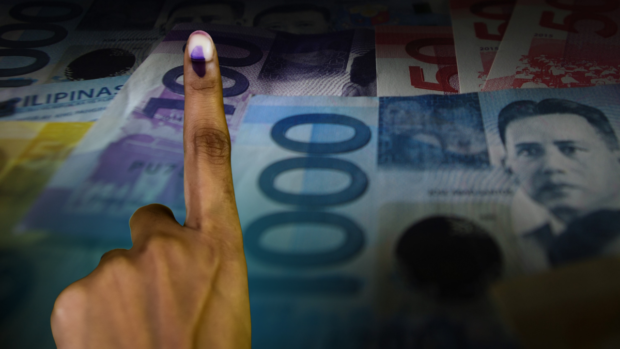‘Vote-buying’ in cash, health cards – even uses QR codes

INQUIRER.net file photo
TACLOBAN CITY, Leyte, Philippines — Despite warnings from authorities, vote-buying and vote-selling remain prevalent in several areas in the Visayas and in Bulacan province in Luzon.
In Tacloban City, the provincial capital of Leyte, cash ranging from P50 to P100 was being distributed by some candidates to voters ahead of the Oct. 30 barangay and Sangguniang Kabataan (SK) elections.
In many parts of the Eastern Visayas region, the vote-buying continued up to Saturday, the last day of the campaign period, involving at least P50 per voter given by candidates vying for seats in the barangay council and P100 for those seeking the village’s top post, according to various sources.
One candidate for village councilor in a city in Eastern Visayas, who spoke on condition of anonymity, said he did not want to engage in vote-buying but had no choice but to join the “kalakaran,” or the usual practice during elections, or his chances of winning would be slim.
“I have to take up a loan so I could have something to give to the voters. I need that to win. Almost all candidates are also doing the same thing. The voters are also waiting for it,” he said.
The candidate declined to reveal how much he borrowed to buy votes.
Seems unstoppable
The Commission on Elections (Comelec) launched a “Kontra Bigay” campaign to stop candidates from buying votes and people from selling theirs on Monday’s polls. It even sought the help of the Bangko Sentral ng Pilipinas to help monitor money transfers online or through electronic wallets.
But vote-buying seems unstoppable even if the candidates are aware that under the Omnibus Election Code the offense is punishable by imprisonment of up to six years, disqualification from public office and deprivation of the right of suffrage.
In Negros Oriental, vote-buying came in the form of “ayuda” (assistance) worth as much as P2,000 per voter, according to Eliseo Labaria, acting provincial election supervisor, based on the reports received by the poll body.
He said the Comelec was still trying to determine who the culprits were based on photos of the distribution of the money that it obtained.
Plus health card
In Negros Occidental, at least 19 complaints of vote-buying had been made, said Provincial Election Officer Ian Lee Ananoria.
“We are waiting for the Comelec law department to rule on the cases,” he said.
The illegal practice also has been reported elsewhere in the country, like in Bulacan province where a reelectionist barangay captain in the town of Pandi is facing a disqualification case before the Comelec.
The complaint was filed on Friday by a village resident who claimed that in exchange for her vote, she personally received from the candidate P1,000 in cash and a health card with her name on it on Oct. 22 .
The complainant said the village chief also allegedly promised to give her another P1,000 on the day of the elections.
She said she was among residents in her village who were “invited” to a get together at barangay leader’s warehouse on Sept. 29, where each one of them was “photographed” and told when they would be invited again to the same place.
QR code
On Oct. 22, she said they were surprised to receive the health card with a QR code from the village chair. The official allegedly told them that the QR code would be scanned postelection to confirm that they had voted for him.
On Saturday, another Pandi resident came forward, claiming that he and several others from the village also received P1,000 in cash allegedly from the barangay chair, with a promise of another P1,000 to P2,000 in cash if they voted for him.Gina Llave, Pandi municipal election officer, told the Inquirer in a phone interview on Saturday that she has yet to receive a copy of the complaint that was filed in the Comelec national office.
Police in Central Visayas promised to be relentless in going after vote buyers and other election law violators.
Lt. Col. Gerard Ace Pelare, spokesperson for the Central Visayas police, said officers would be going around communities ahead of the elections to monitor any election-related crimes, including vote-buying and selling.
“We are ready to conduct warrantless arrest against those who will buy and sell votes,” he said.